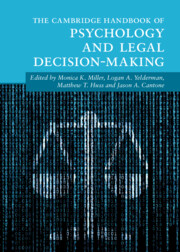Book contents
- The Cambridge Handbook of Psychology and Legal Decision-Making
- Cambridge Handbooks in Psychology
- The Cambridge Handbook of Psychology and Legal Decision-Making
- Copyright page
- Dedication
- Contents
- Figures
- Tables
- Editors
- Contributors
- Part I Introduction Chapters
- Part II Pretrial Phase Decision-Making
- 5 Victim Decision-Making
- 6 Bystanders’ Crime Reporting Decisions
- 7 Pretrial Publicity’s Effects on Jurors’ and Judges’ Decisions
- 8 Police Decisions Involved in Collecting Eyewitness Identification Evidence
- 9 Decisions Related to Miranda Rights
- 10 Judges’ Daubert Decisions
- 11 The Psychology of Confession Decision-Making During Police Interrogation
- 12 Plea Bargaining
- 13 Forensic Science Decision-Making
- 14 Decision-Making by Forensic Mental Health Evaluators
- 15 Interviewing Suspects in Criminal Investigations
- 16 Prosecutorial Decision-Making in Cases of Child Sexual Abuse
- 17 Decision-Making About Restoration of Defendants Who Are Incompetent to Stand Trial
- 18 Clinical Decision-Making Regarding Criminal Responsibility
- 19 Decision-Making Regarding Child Victims and Witnesses
- Part III Trial Phase Decision-Making
- Part IV Postconviction Phase Decisions
- Part V Other Legal Decision-Making
- Part VI Perspectives from the Field
- Part VII Conclusion
- Index
- References
15 - Interviewing Suspects in Criminal Investigations
Decisions and Their Consequences
from Part II - Pretrial Phase Decision-Making
Published online by Cambridge University Press: 22 February 2024
- The Cambridge Handbook of Psychology and Legal Decision-Making
- Cambridge Handbooks in Psychology
- The Cambridge Handbook of Psychology and Legal Decision-Making
- Copyright page
- Dedication
- Contents
- Figures
- Tables
- Editors
- Contributors
- Part I Introduction Chapters
- Part II Pretrial Phase Decision-Making
- 5 Victim Decision-Making
- 6 Bystanders’ Crime Reporting Decisions
- 7 Pretrial Publicity’s Effects on Jurors’ and Judges’ Decisions
- 8 Police Decisions Involved in Collecting Eyewitness Identification Evidence
- 9 Decisions Related to Miranda Rights
- 10 Judges’ Daubert Decisions
- 11 The Psychology of Confession Decision-Making During Police Interrogation
- 12 Plea Bargaining
- 13 Forensic Science Decision-Making
- 14 Decision-Making by Forensic Mental Health Evaluators
- 15 Interviewing Suspects in Criminal Investigations
- 16 Prosecutorial Decision-Making in Cases of Child Sexual Abuse
- 17 Decision-Making About Restoration of Defendants Who Are Incompetent to Stand Trial
- 18 Clinical Decision-Making Regarding Criminal Responsibility
- 19 Decision-Making Regarding Child Victims and Witnesses
- Part III Trial Phase Decision-Making
- Part IV Postconviction Phase Decisions
- Part V Other Legal Decision-Making
- Part VI Perspectives from the Field
- Part VII Conclusion
- Index
- References
Summary
Investigative interviews with suspects are complex interpersonal interactions that are focused on eliciting statement evidence to use within subsequent investigative and judicial processes. When conducting an investigative interview, criminal investigators face a series of decision points – involving potentially competing alternatives – which collectively determine how the interview will unfold. These decisions are also made under real-world constraints of limited time and knowledge. Interviewer decision-making, therefore, is both psychologically complex and practically consequential. In the present chapter we examine the role of interviewer decision-making across five dimensions of investigative interviewing: Why (is an interview conducted?), Who (will participate?), When and Where (will the interview occur?), and What (techniques will be used?). We use this structure to outline the current state of the literature on suspect interviewing best practices and how each decision point raises factual and ethical considerations for interviewers, interviewees, and the criminal justice system more broadly. We conclude by discussing potential future directions for research that can continue to inform effective decision-making in this area.
Keywords
- Type
- Chapter
- Information
- The Cambridge Handbook of Psychology and Legal Decision-Making , pp. 225 - 239Publisher: Cambridge University PressPrint publication year: 2024



